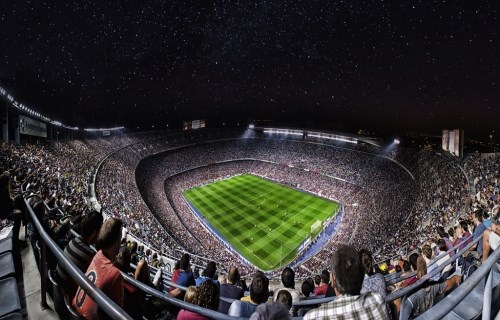CAS upholds FIFA sanctions against FC Barcelona
On 30 December the ground once again shook under FC Barcelona and its talent factory, La Masia, when the Court of Arbitration for Sport, CAS, announced that it had found the Spanish club to be in breach of Article 19 of ‘FIFA’s regulations on the Status and Transfer of Players’ – in no less than ten cases.
FC Barcelona has allegedly bought underage players from as far away as South Korea and USA, despite FIFA’s ‘Regulations on the Status and Transfer of Players’ clearly stating that children under the age of 18 cannot change clubs across continents.
The finding earlier prompted FIFA’s Disciplinary Committee and FIFA’s Appeals Commission in August to “sanction the club with a transfer ban at both national and international level for two complete and consecutive transfer periods, together with a fine of CHF 450.000.” Additionally, the club was given a reprimand.
The FIFA committee found that: “The interest in protecting the appropriate and healthy development of a minor as a whole must prevail over purely sporting interests.”
CAS is upholding this decision: “The Panel found in particular that FC Barcelona had breached the rules regarding the protection of minors and the registration of minors attending football academies. Accordingly, the FIFA decision is confirmed in full and the sanction remains in force.”
FC Barcelona denies any wrongdoing
FC Barcelona instantly announced that the club would proceed by studying and evaluating the different legal options available, such as the possibility of appealing against CAS arbitration to the Swiss Federal Courts.
And the President of FC Barcelona, Josep Maria Bartomeu, was furious after the verdict:
“A great injustice has been committed today: an injustice for Barca, for all the children and parents affected by this decision, for all the Club members and for football in general. I wish to announce that Barca, with myself in the lead, will fight this regulation and improve it. Despite everything, I can guarantee our members that this sanction does not endanger the sporting project at La Masia.”
In its official statement, the club also denies any wrongdoing against children:
“FC Barcelona’s youth structure has enabled hundreds of young players to achieve their dreams and receive a decent upbringing.”
“The errors that the Club might have committed, and which have been recognized and argued before the corresponding authorities are, in all cases, of an administrative nature and to a large extent have been caused by the existing conflict between the FIFA regulations and Spanish legislation, along with the Club’s conviction that it was acting correctly. Therefore, FC Barcelona considers the sanction to be completely disproportionate as it supposes an excessive punishment for the Club.”
A wake-up call for the football industry?
But the verdict could also be a wake-up call for the football industry, where it is a well-known fact that organised trading of underage players, in pursuit of the new Lionel Messi, Cristiano Ronaldo and Neymar, has been taking place for years.
The main perpetrators are the major clubs in Spain, Portugal, France, Italy, Greece and Belgium – with children being reaped mainly from South America, Africa and Asia. For more than two years – right through to 30 December – the free Danish magazine Sport Executive followed and covered the international trade of children, and it asked FIFA on multiple occasions before April 2014 why it had not intervened.
Until April 2014, FIFA had turned a blind eye to what looked like obvious rule violations, as well as the fact that international transfers of children younger than 12 between clubs are not even taken into consideration by the current rules.
Last spring, Mads Øland, a board member of the world players union, FIFPro, said to Sport Executive:
“This is taking place out in the open in the major clubs. It is not just FC Barcelona. They are not even using what you call ‘strawman academies’.”
“No one has done anything about this yet – but the rules are made to be followed. But what can you do? If FIFA lowers the age requirements for international transfer certificates to ten years, the clubs will just go after the nine-year-olds,” Øland argued, and continued:
“The basic problem is that players have been turned into commodities; they are not treated as humans. Players today have a preposterous trade value – and there is so much money involved – and there are astronomical profits on the sales of players that the only right thing to do is to look at the entire transfer system anew. It is out of control and it will end in disaster at some point.”
The verdict could be a step towards stopping this practice. The ban of third-party ownership – coming into action in May 2015 – is another step.
The question is if FIFA will take action against Real Madrid, Atletico de Madrid and a lot of others Europeans clubs to stop child labour – including that involving players under 12 years.
Read more
The CAS press release.
FC Barcelona’s statement to the CAS verdict.
Fighting for the lost football kids
Through his organisation Foot Solidaire, Jean-Claude Mbvoumin has dedicated more than 14 years of his life to the fight against illegal trafficking of young African footballers. It is a fight that is far from over – and one that FIFA recently brought to light through the sanctioning of FC Barcelona and the club’s exploitation of young players.
Major European clubs and anonymous investment funds are fighting across cities, countries and continents over football’s new gold – talented minors.
FIFA has punished FC Barcelona for trading children. But this is only the tip of the iceberg. The trade of minors is standard practice in European football – and has been for years. Now, for the first time since the sanctions against the Spanish club were issued, FIFA responds to enquiries regarding the case.






